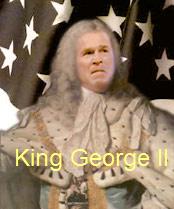 I've complained previously that President Bush does not feel constrained by the need to show respect for the courts in getting warrants to conduct surveillance on American citizens, within the United States, when there is not even reason to suspect criminal activity taking place. Now, I read that he does not feel constrained by Congress' explicit condition of oversight over surveillance activities for renewing the USA PATRIOT Act.
I've complained previously that President Bush does not feel constrained by the need to show respect for the courts in getting warrants to conduct surveillance on American citizens, within the United States, when there is not even reason to suspect criminal activity taking place. Now, I read that he does not feel constrained by Congress' explicit condition of oversight over surveillance activities for renewing the USA PATRIOT Act.It makes me wonder: did Attorney General Gonzales fail Constitutional Law in law school by just a little bit, or did he really, really bomb it? Do these people understand that 230 years ago, we revolted against a monarchy? What makes them think we want one now?
UPDATE: I found an excellent column by Dahlia Lithwick at Slate explaining why this is such a pernicious issue. Other readers may also be interested in my exchange with an anonymous commenter from the Jersey side of the river, near Philadelphia.

By making such an silly statement, it's clear you're the one who failed conlaw, or should have. Courts have consistently upheld that the president has inherent constitutional powers which cannnot be taken away by congress. Among those powers is survaillence of the ENEMY during WARTIME. This is not a criminal investigation. Your failure to make this distinction demonstrates your own lack of constitutional scholarship. Give the "King George" line a rest.
ReplyDeleteRTFA, dude, and put the straw man away.
ReplyDeleteFirst of all, there is no question that the President has the power to conduct surveillance on the enemy. No one, myself included, has ever denied that the President possess that power or that there is a legitimate need to gather this information.
Secondly, Amendments IV and XIV contain no limits to criminal investigation.
Thirdly, I have insisted that the government get a warrant from a court before using his power of surveillance on United States citizens. United States citizens are entitled to a presumption (rebuttable, to be sure) that they are not enemies of their own country and that their own government will not spy on them without observing very minimal requirements of due process. As citizens, we are entitled to that presumption whether it is a criminal investigation or some other intrusion into our privacy that's going on.
But fourth and finally, all of this is beside the point. The article is not about the President spying on people, it's about him reporting on his surveillance activities to Congress. Either the President needs Congress' authority to perform certain kinds of surveillance under the USA PATRIOT Act, or he does not. If he did not need that kind of authority, he need not have asked for it in the first place. Instead, he begged for it since the beginning of his re-election campaign. And he got it -- on certain conditions, specifically, that he report periodically to Congress on how he is using that power. So since he does need Congress' authority to do these things, and he got that authority predicated upon certain conditions imposed upon him by Congress, he needs to do what Congress requires of him to exercise those powers -- conditions which are not onerous or burdensome and which will take place in a classified, non-public hearing.
My beef here is about how the President believes he can pick and choose which portions of a law passed by Congress that he has to obey, and which he can disregard. Line-item editing of Acts of Congress is not one of the President's inherent powers. He can't just do anything he wants and say it's justified in the interest of national security. No President has ever had that power, even in wartime. That's where the "King George" line comes from and I think it's quite droll.
...And I aced Con Law, thank you very much.
Korematsu v. United States
ReplyDeleteKorematsu is hardly a precedent of which we can be proud, Manzanar Boy.
ReplyDeleteBut what's your point? The detention order in Korematsu was previously authorized by Congress, and the order did not exceed Congress' grant of authority.
President Bush, however, maintains that prior approval of either the courts or Congress is unnecessary to conduct surveillance.
The Korematsu Court wrote that it would defer to the military's judgment because "..the military authorities considered that the need for action was great, and time was short" (emphasis added). Such is not the case today. There is time to observe the requirements of due process while gathering intelligence about our enemies.
Of course, the Supreme Court can sometimes get it wrong, too. It got it wrong in Bowers v. Hardwick, too, and only recently reversed its decision. It has not had occasion to revisit the Korematsu case.